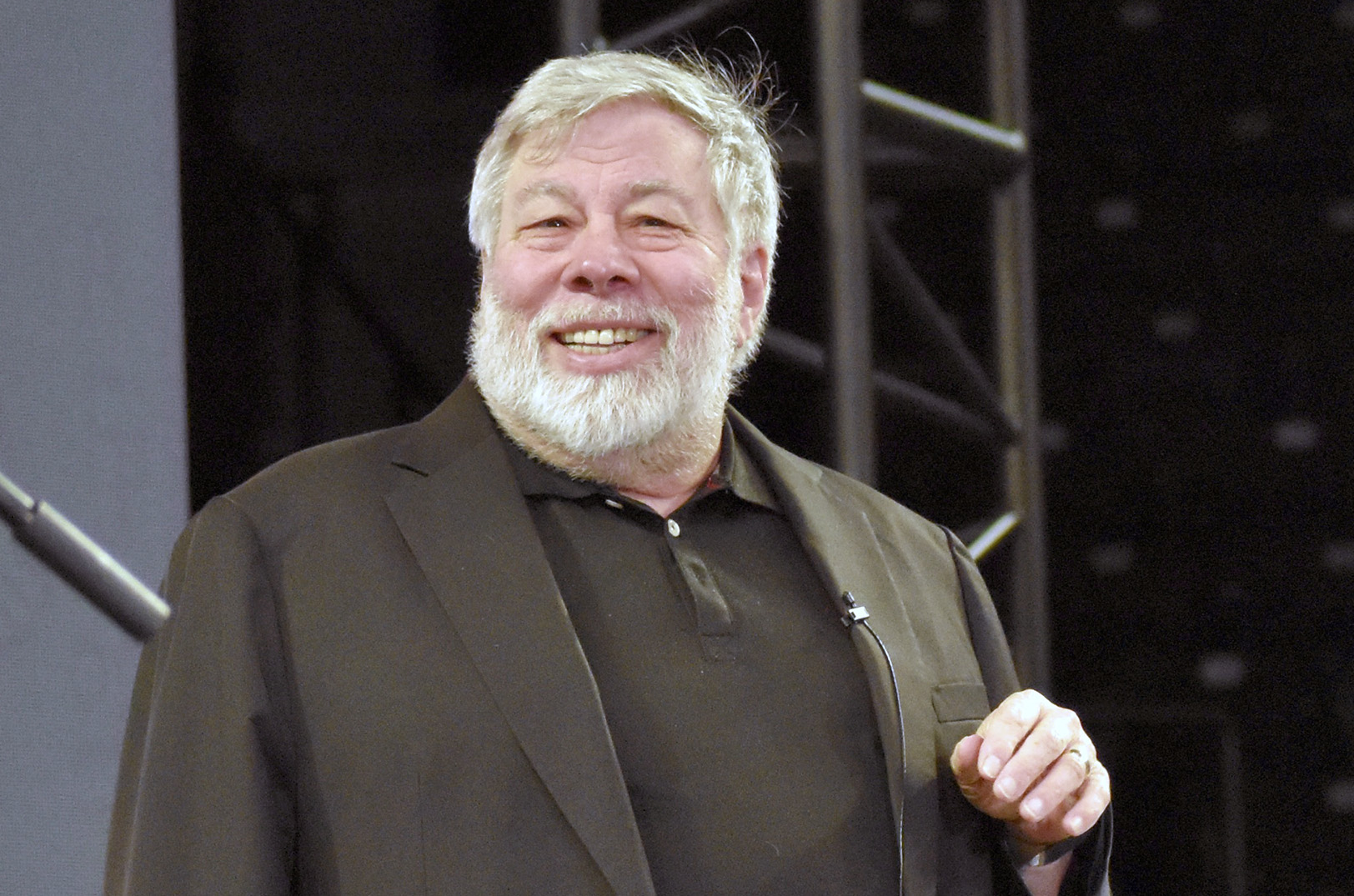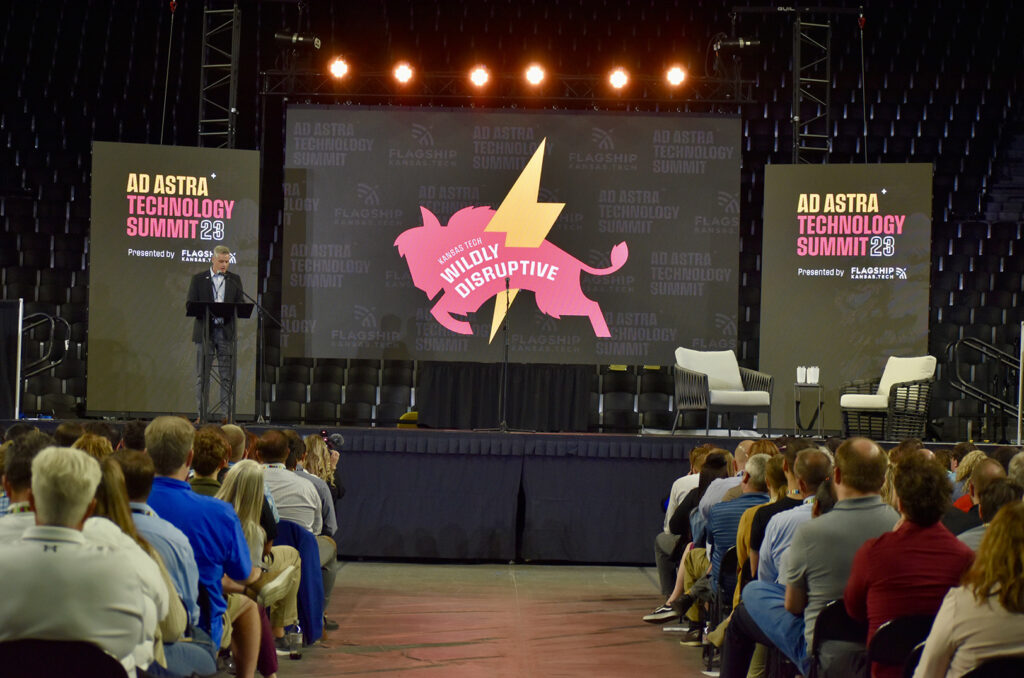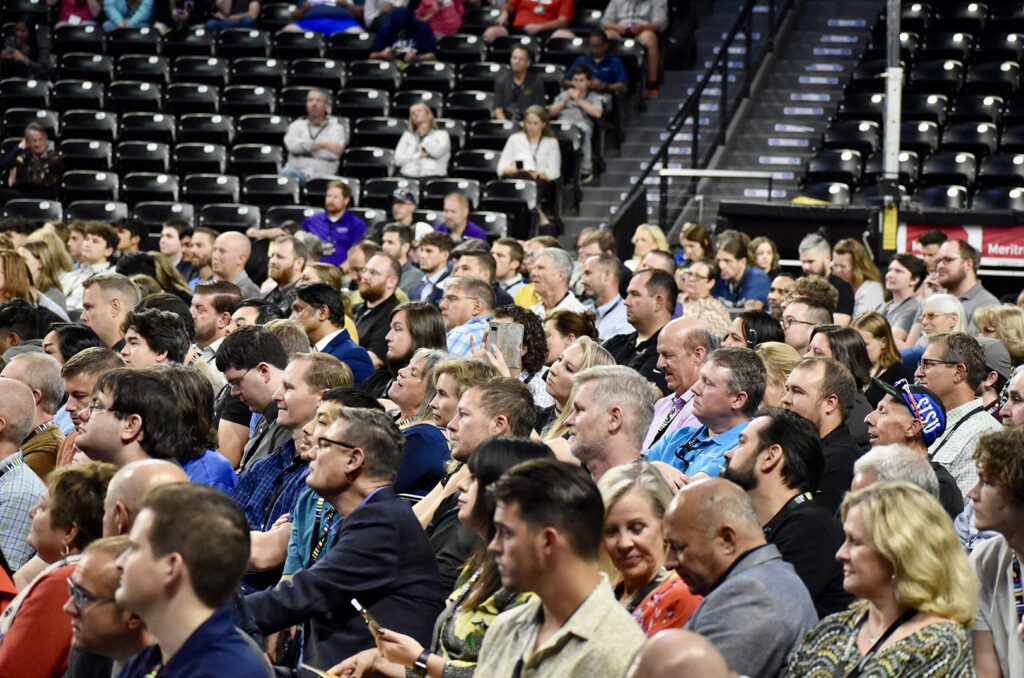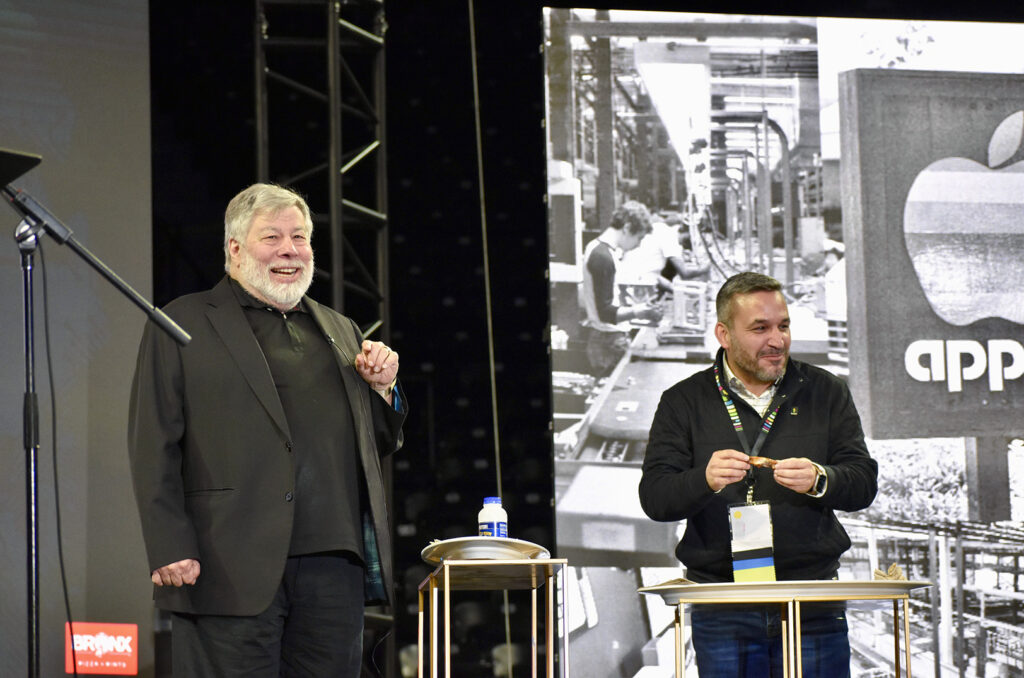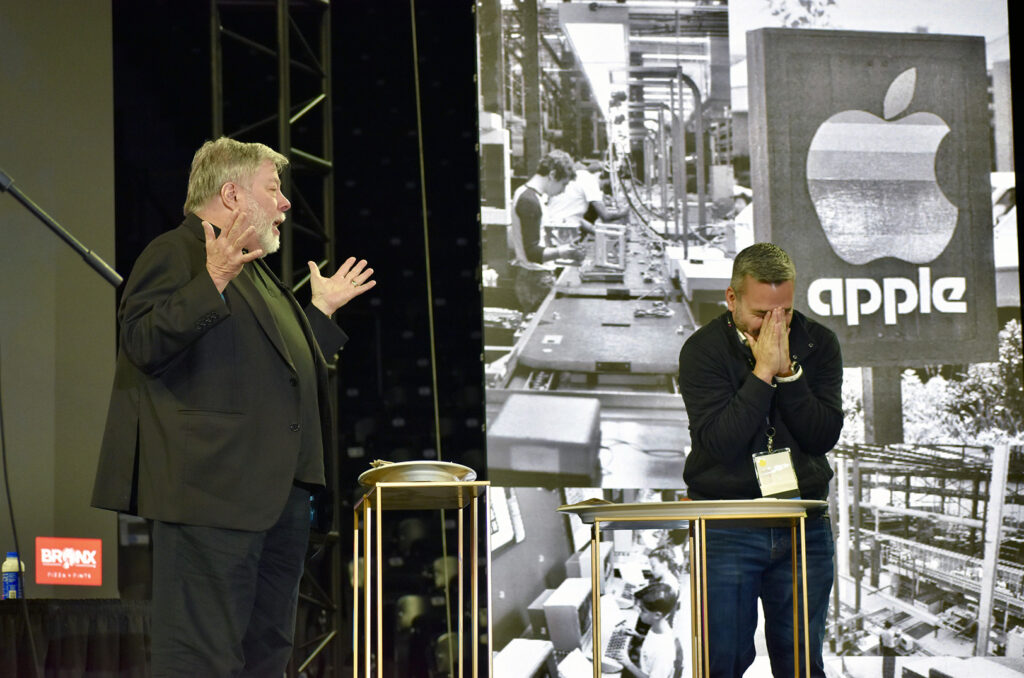Startland News’ Startup Road Trip series explores innovative and uncommon ideas finding success in rural America and Midwestern startup hubs outside the Kansas City metro.
WICHITA, Kansas — Artificial intelligence won’t replace humans, shared Apple co-founder and tech giant Steve Wozniak, but the rapidly advancing technology should come with a warning label.
AI is just the latest stage of what a computer can do to help people make decisions and get through life their way, the tech entrepreneur and computer engineer told the crowd Monday at the Ad Astra Technology Summit — hosted by Flagship Kansas Tech — on the campus of Wichita State University.
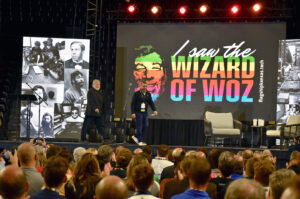
Steve Wozniak, Apple co-founder, takes the stage alongside Luis Rodriguez, Keycentrix, at the Ad Astra Summit in Wichita; photo by Nikki Overfelt Chifalu, Startland News
“The computer has never equaled the mind,” Wozniak said. “A computer isn’t gonna sit back and say, ‘What should I think of today?’ Or know what a joke is. It can read other jokes and sort of figure out what other jokes are, but it really doesn’t create for itself. It grabs a lot of stuff with crawlers on the Internet, trying to grab parts of the Internet and sort of make sense of it.”
“The computers just get better and better and better at doing more and more to help humans with our needs,” he added.
The latest headline-grabbing AI-powered tech — Chat GPT — sounds intelligently written, Wozniak continued, but it’s not the same as intelligence.
“The human should be the editor in the end and edit it down,” he explained. “AI is like the recorder. It can get all this information off the web much faster than I could by searching searching, searching and bring it in a good sensibly written form. But I’ve got to decide which I want to use for my audience and that involves a lot of emotion.”
With all the advances in AI, he noted, comes a lack of trustworthiness.
“We’ve had too many examples where it just hallucinates and goes off track and makes up things that didn’t exist,” he said, noting AI is only as good as the source material it pulls from, and the internet is rife with incorrect data. “There’s a lot of misinformation. I’m for truth. I see truth as an apex of all the good you do in your life.”
“Be careful what you’re reading,” he continued. “We’ve got to train people in schooling to really be skeptical and ask questions. It’s so easy to be tricked these days.”
Many people have said that Chat GPT should be regulated, Wozniak shared. Like academic journals, Chat GPT needs to cite its sources, he concluded.
“You should know where that particular AI was trained,” he explained, “what parts of the Internet, what parts of the world that data is trained by. You should be told what question was asked to bring this report out, because if you change the question to an AI a little bit, you get a whole different report.”
The AI boom right now — where a lot of companies are trying to incorporate it into their products — reminds Wozniak of the early days of the mainstream Internet in the late 1990s, he noted.
“Everybody that had an idea for putting something in life on the internet got funded, funded, funded, funded, funded,” he said. “Then they all collapsed because people can’t take that much change over a short time and so they all went bust and we had the dot-com bust.”
“It was one of the best things in my life,” he joked, “because in the Bay Area — Silicon Valley — you could drive anywhere. People were moving out, losing jobs. I judge the economy by how well driving is.”
Catalyst for change
Wozniak joined Luis Rodriguez, Flagship Kansas Tech’s immediate past chair and president of Keycentrix, in a fireside chat, live Q&A session, and fiery game of “Blab or Burn” to conclude a full day of sessions at the Ad Astra Technology Summit.
Flagship was launched in 2018 when visionary tech companies united under one banner, fueled by a shared vision and an insatiable desire to champion the tech landscape in the state, shared Ben Sebree, the chair of the Flagship board and senior vice president of research and development for Civic Plus.
The organization sets out to achieve its mission through the three pillars of awareness, education, and workforce.
“Kansas — time and time again — has demonstrated its potential to shine as a thriving tech hub,” Sebree said. “However, misconceptions about our region threatened to overshadow our growth and potential. Flagship was born to harness the collective energy of the Kansas tech community, ensuring your voice resonates, impact is felt, and change is ignited where it matters to us.”
“Flagship isn’t just merely an organization,” he added. “It’s a catalyst for change, change in our city. It’s a vibrant platform where the passionate innovation and determination of the Kansas tech community intersects to research the future of technology in our state.”
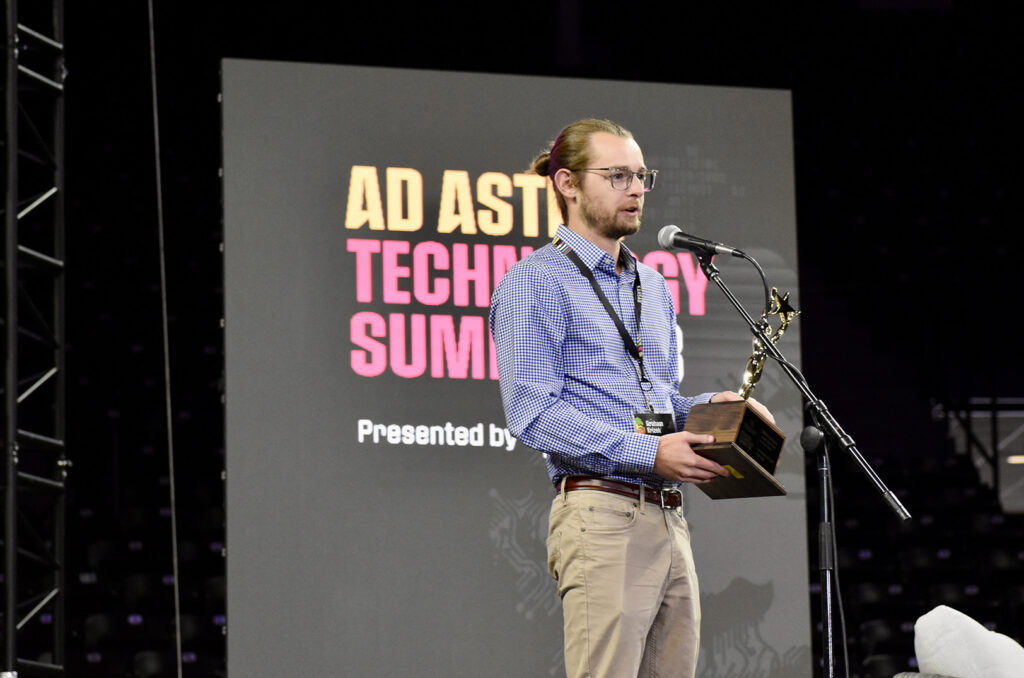
Graham Krizek, Voltage, accepts the Startup of the Year award at the Ad Astra Summit in Wichita; photo by Nikki Overfelt Chifalu, Startland News
During Monday’s event, Flagship also handed out awards that fell under its three pillars:
- Startup of the Year — Voltage, Wichita
- Educator of the Year — Christopher Spindler, Dodge City High School
- K-12 Students of the Year — Adria Dumler and Evan Rogerson, Maize High School
- College Student of the Year — Sierra Bonn, Wichita State University
- Community Innovator of the Year — David Cochran, Newman University
- Community Visionary of the Year — Luis Rodriguez, Keycentrix
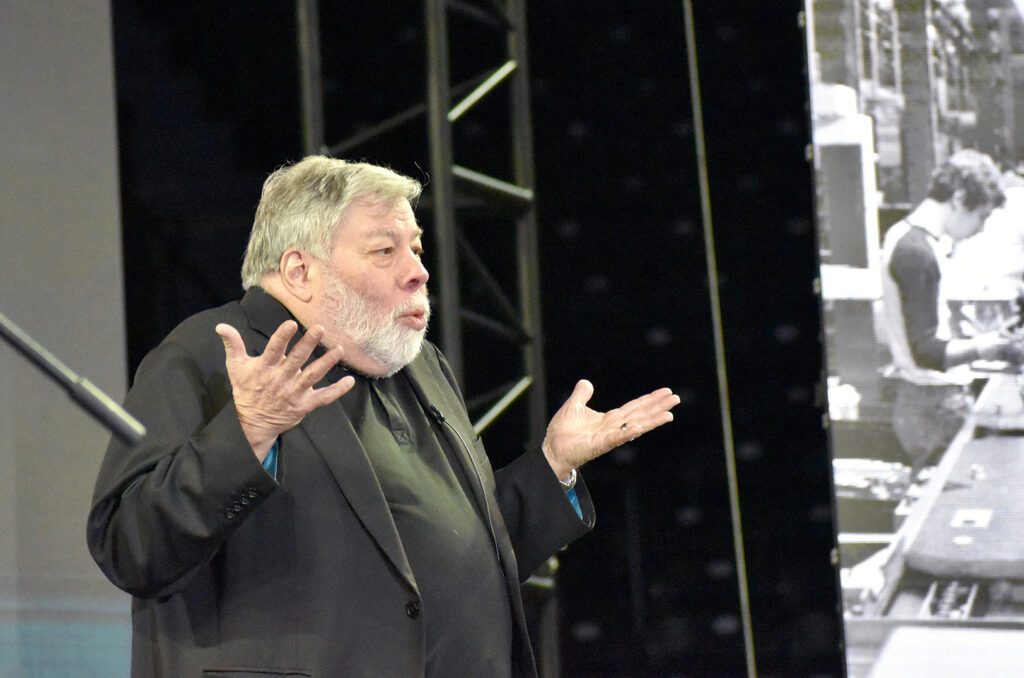
Steve Wozniak, Apple co-founder, speaks during the Ad Astra Summit in Wichita; photo by Nikki Overfelt Chifalu, Startland News
‘A very unusual engineer’
In addition to discussing the future of AI, Wozniak also spoke Monday about how he met his wife — a teacher from Kansas — on a “Geek Cruise,” his love for teaching students, his early computer designs, how Hewlett Packard turned him down five times for his personal computer ideas, and the early days at Apple.
He said starting a company to make money was never his idea. He was just a resource used by co-founder Steve Jobs.
“I just wanted to be the engineer,” he explained. “I didn’t want a company. I didn’t want to start an industry. I wanted my computer to get out, but I wanted other engineers to look at my designs and say, ‘How have you ever come up with that? How many think that way?’ Because I was really a very unusual engineer. So I wanted the respect of other engineers and I have gotten it over time.”
This story is made possible by Entrepreneurial Growth Ventures.
![]() Entrepreneurial Growth Ventures (EGV) is a business unit of NetWork Kansas supporting innovative, high-growth entrepreneurs in the State of Kansas. NetWork Kansas promotes an entrepreneurial environment by connecting entrepreneurs and small business owners with the expertise, education and economic resources they need to succeed.
Entrepreneurial Growth Ventures (EGV) is a business unit of NetWork Kansas supporting innovative, high-growth entrepreneurs in the State of Kansas. NetWork Kansas promotes an entrepreneurial environment by connecting entrepreneurs and small business owners with the expertise, education and economic resources they need to succeed.




